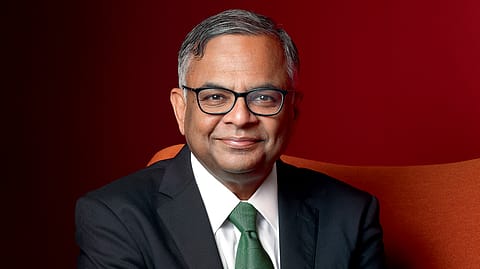GenAI is a 'civilizational shift', not just another tech cycle: N Chandrasekaran
TCS will deliver GenAI solutions through a human+AI model, invest in AI infrastructure and forge industry-best partnerships, says Tata Sons chairman N Chandrasekaran.

N Chandrasekaran, the chairman of Tata Sons and Tata Consultancy Services (TCS), believes that generative artificial intelligence (GenAI)—the single most transformative force in 2024—is a “civilizational shift” and not just another tech cycle.
“I believe every industry stands to benefit from GenAI. TCS is proactively leading this change. We have systematically infused AI across our offerings and built intelligent agent solutions throughout the value chain. Looking ahead, we will deliver solutions through a human+AI model, invest in AI infrastructure and forge industry-best partnerships,” Chandrasekaran said in the IT company’s integrated annual report.
With Generative AI and other emerging technologies, TCS enabled its clients to prepare for the future, said the Tata Sons chairman. “For example, we worked with a client to develop a GenAI–based drug discovery solution that created over 1,300 molecules for a concept target, then assessed synthesisability and shortlisted 12 molecules undergoing in-vitro testing. For another client, we implemented a direct-to-consumer digital solution for the automotive industry, allowing a seamless omnichannel presence and customised vehicle ownership experience. In another case, we modernised 50 million lines of legacy code into a modern AI-powered architecture,” explained Chandrasekaran. “The range of transformation is multifaceted and truly profound,” he added.
GenAI’s widespread adoption is accelerating, powered by parallel advances in semiconductors, cloud computing, quantum technologies, robotics, and energy innovation, said Chandrasekaran. “GenAI is already redefining analytics, customer experience, and marketing. The rise of autonomous robots and AI agents promises a future of ‘dark factories’ and AI-assisted enterprise functions,” he said.
“I believe every industry stands to benefit from GenAI—and the IT industry is no exception. TCS is uniquely positioned to lead this transition. With our domain expertise, deep client relationships, and contextual knowledge, we are the ideal partner for enterprises seeking to build AI-first cultures, transform supply chains, navigate energy transitions, and build resilient and adaptive operations,” the Tata Sons chairman said.
“However, to lead in this new world, we too must continuously evolve. The path is clear: IT and business services are moving toward autonomous operations. Software development is being redefined by AI-led modernization, as legacy code is being transformed rapidly. Finally, agentic AI is being embedded deeply into enterprise systems,” Chandrasekaran noted.
TCS, according to Chandrasekaran, is proactively leading this change. “We have systematically infused AI across our offerings and built intelligent agent solutions throughout the value chain. In 2025, we will have the largest AI-trained workforce in the industry and have launched our enterprise-grade GenAI platform: TCS WisdomNext,” he said.
Recommended Stories
“Looking ahead, we plan four distinct progressions. First, we establish a large pool of AI agents working alongside our human workforce. Second, we deliver solutions through a human+AI model. Third, we will consciously invest in AI data centers and cloud infrastructure. Fourth, we forge industry-best partnerships with hardware providers, solution innovators, and startups. This integrated approach will help us bring the best capabilities to every customer, ensuring they are future-ready, resilient, and competitive,” explained Chandrasekaran.
